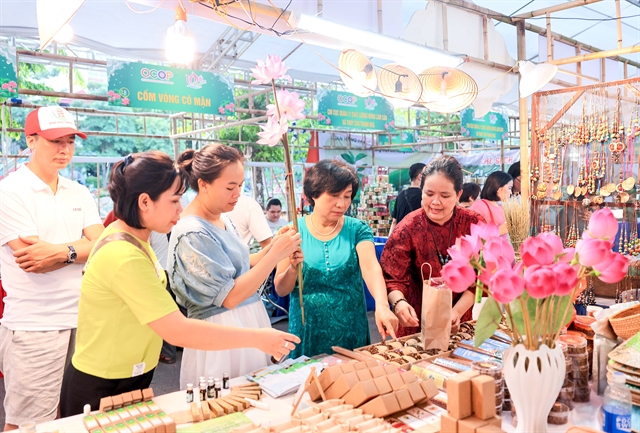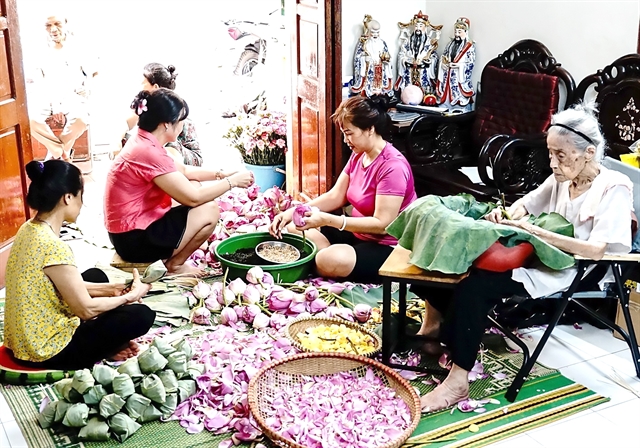 |
| People look at lotus-based products at a booth at Hà Nội Lotus Festival last week.— VNA/VNS Photo Hoàng Hiếu |
HÀ NỘI — Hà Nội has promoted the development of craft villages that produce lotus-based products, integrating tourism and enhancing the impression of the local area.
The initiative aims to create unique products which attract tourists to experience the beauty and culture of the lotus in the city.
Nguyễn Mạnh Quyền, deputy Chairman of the People’s Committee of the city, said that in Vietnamese culture, the lotus symbolised purity and clarity, embodying the spirit and identity of the Vietnamese people.
Beyond its spiritual and religious significance, the lotus was a versatile plant offering nutritional and practical uses.
Most parts of the lotus plant can be used as food, medicine or high-quality materials for the textile industry.
Lưu Thị Hiền, owner of Hiền Xiêm Lotus Tea in Tây Hồ District said her family had a long tradition of making lotus tea.
In the past, it was mainly for personal use and gifts during holidays.
“As the market economy developed, more people sought out lotus tea as a unique gift of Hà Nội, increasing demand and leading us to expand our family business,” she said. Her family currently rents seven ha of West Lake to cultivate Bạch Diệp lotus.
According to Hiền, producing one kilogramme of lotus tea requires 1,500 lotus flowers, costing several million đồng.
“West Lake lotus tea, known as the ‘tea of the ancients,’ offers a delicate, refreshing flavour. The taste results from the blend of tea leaves and the fragrant Bách Diệp lotus,” she said.
Lã Quang Khanh, director of Mê Linh Lotus Village Cooperative, said that they cultivate 50 ha of lotus, including Bạch Liên and Bạch Diệp varieties, originating from the West Lake.
From May to September, the cooperative harvested and supplied the market with 8,000 to 10,000 lotus flowers daily.
In addition to meeting local demand for lotus flowers, the cooperative also collaborated with Tâm Trà Thái Cooperative in the northern province of Thái Nguyên and Bắc Sơn Tea producers in Hà Nội’s Sóc Sơn District to supply lotus flowers and leaves.
Both lotus flowers and lotus tea have been recognised as three-star and four-star One-Commune One Product (OCOP) products by Hà Nội.
The lotus flowers and lotus tea were supported by Mê Linh District to build the brand of ‘Bạch thiên sen Hải Linh’ that showcased at various fairs and exhibitions.
The OCOP lotus tea consisted of fresh and vacuum-dried varieties.
To enhance quality and diversify products, the cooperative planned to introduce lotus tea bags and lotus leaf tea by the end of this year, he said.
Hà Nội has developed numerous specialty products made from lotus, reflecting the city’s cultural heritage and providing economic benefits.
The products include Hiền Xiêm lotus tea in Tây Hồ District, Quảng An lotus tea in Tây Hồ District, Đầm Long lotus seeds in Ba Vì District, lotus leaf tea in Sóc Sơn District, lotus heart tea in Thanh Trì District and Ngô Thức green sticky rice with lotus seeds in Nam Từ Liêm District.
Among the 2,723 OCOP-rated products in Hà Nội, there are 18 lotus-based products.
Integrating ecotourism
 |
| Lotus tea marinating at a family of artisans in Tây Hồ District, Hà Nội.—VNA/VNS Photo Khánh Hòa |
According to associate Professor Đặng Văn Đông from the Institute of Vegetables and Fruits, under the Ministry of Agriculture and Rural Development, Việt Nam’s distinct regions each had characteristic lotus varieties.
There are pink lotus in the Mekong Delta province of Đồng Tháp, white lotus in the coastal central province of Huế, and Bách Diệp lotus in West Lake in Hà Nội.
Bách Diệp lotus was a valuable species, requiring preservation and development.
To restore and expand the Bách Diệp lotus variety, the city’s Agriculture and Rural Development Department, the Institute of Vegetables and Fruits and the People’s Committee of Tây Hồ District have implemented the project ‘Building a lotus production model associated with developing ecotourism along the value chain in Tây Hồ – Hà Nội’.
The project also aimed to link lotus cultivation with ecotourism in Tây Hồ District.
In addition to the renowned West Lake lotus tea, the lotus-themed feast, a unique culinary tourism product, is popular in Đường Lâm ancient village, featuring over ten lotus-based dishes.
Lâm Thị Na, owner of a restaurant in the village said; “Initially, we offered a few lotus dishes like lotus sticky rice, lotus root salad and lotus seed sweet soup. Then many visitors suggested creating a specialised lotus feast to attract tourists and now it’s a popular order among visitors to the village.”
Textile industry materials
Today, lotus cultivation in Hà Nội’s suburban districts supplies high-quality materials for the textile industry, producing fragrances and starch.
The unique lotus silk, crafted by artisan Phan Thị Thuận in Phùng Xá Commune, Mỹ Đức District, is particularly notable.
Thuận’s lotus silk scarves, a potential five-star OCOP product, are used by the Government Office as gifts for foreign dignitaries.
Currently, Hà Nội has over 600 ha of lotus cultivation, with plans to expand to 900 ha by next year.
Major cultivation areas include Mỹ Đức (188 ha), Ba Vì (70 ha), Mê Linh (65 ha), Phúc Thọ (25 ha), Ứng Hòa (25 ha), Bắc Từ Liêm (25 ha), Tây Hồ (19.6 ha) and Quốc Oai (18 ha).
Nguyễn Đình Hoa, deputy director of the city’s Agriculture and Rural Development Department said the department tasked the Agricultural Promotion Centre and the Institute of Vegetables and Fruits to test over 30 new lotus varieties in the city.
Then the department had selected 20 lotus varieties that shown excellent adaptability to Hà Nội’s soil.
The lotus varieties include specialised lotus types for roots, flowers, silk and seeds with high yield and quality.
Advances in science and technology have extended Hà Nội’s lotus season from April to November. — VNS
- Reduce Hair Loss with PURA D’OR Gold Label Shampoo
- Castor Oil Has Made a “Huge” Difference With Hair and Brow Growth
- Excessive hair loss in men: Signs of illness that cannot be subjective
- Dịch Vụ SEO Website ở Los Angeles, CA: đưa trang web doanh nghiệp bạn lên top Google
- Nails Salon Sierra Madre
 VnExpress News The News Gateway of Vietnam
VnExpress News The News Gateway of Vietnam





